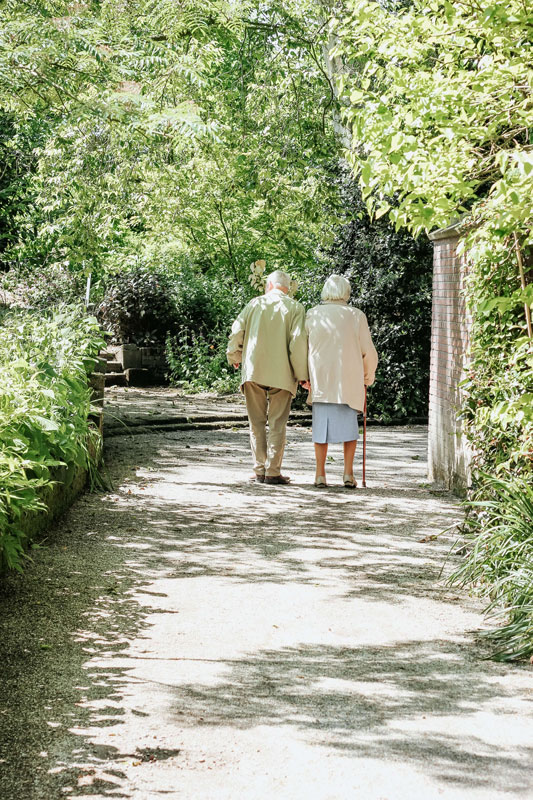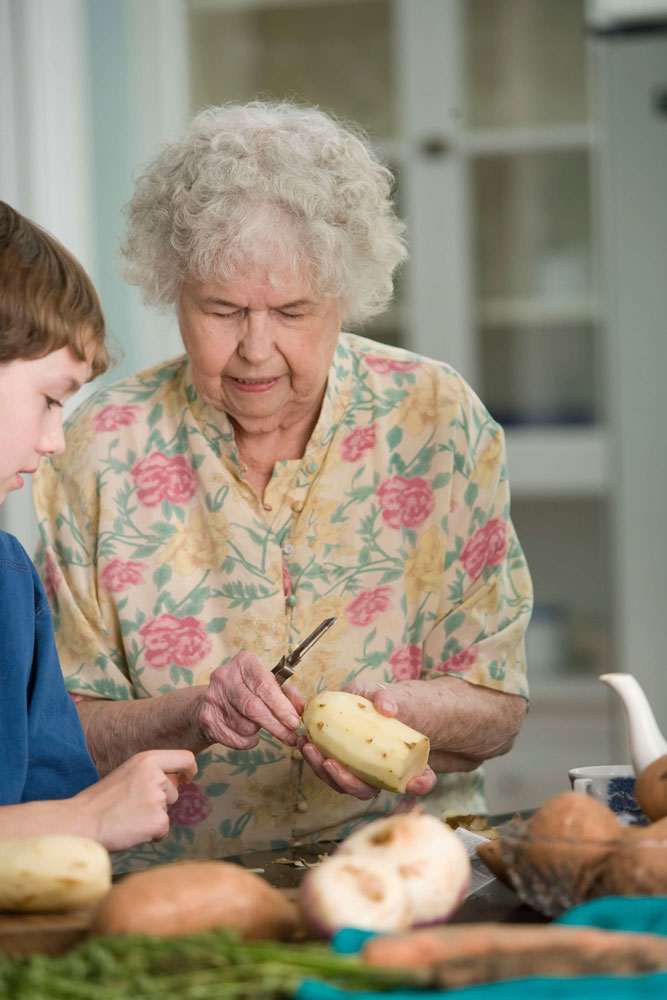1) Have a Sense of Purpose

Seniors who have a sense of purpose in their lives tend to be happier than those who don’t. This is something most people can relate to at any age!
As people get older, though, their sense of purpose changes. When you were younger, your purpose might have been to build a career or raise your children. Now that you are older, you may have to find different ways to find purpose.
While family may still be an important part of a senior’s life, it may not afford the sense of purpose it once did due to changing family roles. Parents become grandparents and grandparents become great grandparents.
Find a sense of purpose by creating goals and developing new projects.
For seniors who feel as if their life is lacking a sense of purpose, there are ways to regain that purpose. One good place to start is with a routine that you enjoy. Incorporate in the activities that you like the most, such as a morning yoga or prayer and meditation.
Maybe you like to allot time in the afternoon for reading. When you create an outline for your day, make sure to leave some room for the opportunity to become engaged in something unexpected.
Being creative and trying new hobbies (or reigniting old passion projects!) is an excellent way to find that sense of purpose. Once you start looking, it’s only a matter of time before you’ll find it! (Or before it finds you!)
2) Take Care of Your Appearance
Physical appearance is so much more that most people ever realize. Taking care of how you look significantly affects the way you feel!
Seniors who take the time to take care of their physical appearance often feel better about themselves.
Even simple tasks, like taking a shower, washing your face, combing through your hair, and wearing nice clothes will impact your mood.
Taking care of your appearance doesn’t have to take a lot of time, either! Make a habit of taking good care of your physical appearance each day, it will become a natural part of daily life.
If you’re feeling “low”, taking a little bit of extra time to care for your appearance can help bring your mood back up.
Trying out a new hairstyle or getting a haircut can also improve your mood.
Remember the famous line “If you look good you feel good”.
3) Exercise and Spend Time Outdoors

Getting regular exercise and spending some time outdoors is great for being happy. There are many opportunities to exercise outdoors, such as Tai Chi or yoga classes that take place in a park. Also, you can go for a walk or a gentle hike, or go to the beach for a walk or a swim.
Exercise releases endorphins (“happy hormones”) and can help improve and maintain mobility into old age, which can contribute significantly to higher levels of happiness over the long term.
Nature also is scientifically proven to improve happiness levels. Humans are inherently integrated with nature in a mutually beneficial relationship. When you take the time to be in nature, you reconnect with the world around you and also with yourself.
If you prefer a form of exercise that’s indoors, there are still many other ways to get outdoor time! Experts recommend activities such as planting flowers, gardening, bird watching, or other similar activities that involve direct interactions with the natural world.
Many seniors enjoy gardening or light landscaping activities because they’re meditative and quiet, but they also are goal oriented and visibly productive. It’s an excellent, balanced activity for seniors who wish to improve their mood.
4) Eat Well and Take Care of Your Health

Physical health is the cornerstone of happiness. Without physical health, it can, at times, be very difficult to feel happy. Problems like chronic pain, lethargy, dementia, and even mental health issues all stem initially from physical issues. And many physical issues begin with a poor diet.
Diet
Currently, conventional medicine places very little emphasis on the role of diet in maintaining mental health. Indeed, many doctors place little emphasis on diet in maintaining physical health.
But diet plays a role in both mental and physical well-being and there is a substantial amount of scientific research to back up that claim..
Sometimes, if your diet isn’t meeting your needs, it may become physiologically impossible for you to feel happiness. Eating a lot of processed foods can hijack your body’s ability to feel happiness in between meals.
Eating a whole foods diet that includes some animal products and that excludes refined sugars is a good place to start if you’re running low on happiness. Low blood sugar can feel like unhappiness, after all, for the duration of time that it lasts.
By eating a diet that’s free of refined sugars and that instead includes healthy low-glycemic index sugars like honey or coconut palm sugar can help you re-balance your mood so that you feel happier.
Vitamins, Minerals, and Herbal Supplements That Can Help You Feel Happier
Iodine
Many people think they’re getting enough iodine when they eat iodized salt, but what they don’t realize is that the fluoride in water and toothpaste and the bromine in insecticides, furnishings, and vehicles competes with that iodine in the thyroid gland and reproductive organs.
The subsequent lack of bioavailable iodine can cause depression, weight gain, and an inability to focus. When bromine and fluorine get into the thyroid gland and reproductive organs, they hijack the hormones released from these glands.
Both bromine and fluorine are ubiquitous in industrialized societies and there’s no way to escape from them. But it is possible to supplement with extra iodine!
Taking iodine supplements that contain both pure iodine and potassium iodide can be life-changing for seniors who suffer from inexplicable unhappiness.
Just be aware that at first, iodine supplements will cause a rash and brief episodes of depression as bromine and fluorine leave the body!
Vitamin B12
If you’re vegan or vegetarian, you’ll need to get regular supplemental vitamin B12 shots from your doctor at least once or twice each year (more often is better).
A vitamin B12 deficiency can cause people to not only feel depressed, but a lack of this crucial vitamin can also cause symptoms of dementia that are often misdiagnosed as Alzheimer’s Disease!
Animal products are the only source of vitamin B12 in the diet that can prevent deficiency. And seniors tend to have a lot of trouble absorbing this vitamin from dietary sources due to changes in the digestive system.
Not long ago, doctors would give seniors a vitamin B12 shot (the most bioavailable form of this vitamin) every time they went to the doctor’s office whether they seemed to be deficient in this vitamin or not, but today, due to changes in insurance reimbursement policies, patients have to ask for vitamin B12 shots and sometimes doctors will refuse them.
Patients can go to a boutique IV therapy business in an urban area instead if they suspect that they’re low on vitamin B12.
Amino Acids
Few seniors realize how a lack of amino acids (the building blocks of proteins) in the diet can lead to feelings of unhappiness, depression, anxiety, lethargy, inability to focus, and more.
Even seniors who eat a diet high in amino acids (found in proteins like meats) may experience poor moods because their bodies can’t properly digest them. IV Amino Acid therapies are available in many urban areas and amino acid powders that are easy to digest can be used to supplement the diet as well.
Mucuna Pruriens
If you’re taking chronic prescription medications, you’ll need to talk to your doctor before taking Mucuna Pruriens. This is an herb that helps your brain make more dopamine and serotonin (the two neurotransmitters most responsible for allowing us to physically experience feelings of happiness).
Mucuna is just a bean that’s eaten daily as part of the diet in some areas of the world such as Central America. It is related to senna, an herb that helps relieve constipation and Mucuna can help rebalance the digestive system and also work on brain and mood health.
This herb promotes the production of testosterone in addition to its role in neurotransmitter balance, so it’s well-known as an aphrodisiac! But check with your doctor before taking Mucuna to make sure that this herb won’t interfere with other medication you may be taking.
Kudzu
Kudzu is another dopamine and serotonin-producing herb that’s related to Mucuna Pruriens. It can be taken in pill form or drunk as a tea. It grows naturally in Asian countries like Japan and it was imported and grows in the southern U.S. as well.
Check with your doctor before taking Kudzu. This herb can interact negatively with other prescription medications.
5-HTP
Often, people who take Mucuna Pruriens or Kudzu also need to take 5-HTP to help their bodies balance serotonin and dopamine levels.
Dopamine and serotonin work together and they must be balanced in order for a person to feel happy.
Though both Mucuna and Kudzu contain serotonin precursors, some people need more 5-HTP because they lack the proper amount of serotonin precursors in their diet to be able to produce sufficient amounts of serotonin.
Always talk to your doctor first before taking 5-HTP as a supplement. It can negatively interact with MAOIs and other medications that inhibit reuptake of serotonin or that in any way affect the production of serotonin (e.g. prescription anti-depressants).
Vibrational Medicine for Happiness
If you suffer from depression, your doctor may prescribe a neurostimulation device to control the problem.
The technology for this type of therapy was initially developed by Dr. Robert Beck, an orthopedic surgeon who explored the possibilities around healing using electrical currents.
His work led to the discovery of neurostimulation that uses very gentle electrical currents to improve mood. Later, it was FDA approved and a similar product was developed and patented by Fischer-Wallace.
A non-prescription version of the same device (known as the BioTuner) is available through a company called Sota. Because it is a type of electrical stimulation, this type of therapy does not interfere with prescription medications.
4) Spend Time with Loved Ones

Spending time with family and friends, the people that you love, is an important source of happiness for most people, especially seniors. Studies have shown that spending close, quality time with loved ones can boost the production of oxytocin in the brain, leading to feelings of contentment, peace, and most importantly, happiness.
Family is also often a source of sense of purpose as well as fun, which are both crucial components of happiness for seniors.
Spending time with loved ones can be difficult sometimes, since all families have their disputes and arguments, but these disagreements are part of what brings family members closer to each other over time.
Family matters are complex and require thought, but they can also be rewarding. And, family matters. No matter the situation, almost all seniors agree that family is one of the most bountiful sources of happiness and joy in their lives.
And, as people reach old age, they sometimes find themselves in a new and satisfying position of wisdom and experience in the family unit. This change can be jolting at first, but after an adjustment period, a lot of seniors enjoy their new role and derive a lot of pleasure from giving advice and listening to family members of all ages.
5) You Have Fun

Having fun is important at any age. For seniors, having fun can sometimes be a process of relearning, since the way that seniors have fun is often different from the way that they had fun when they were younger.
However, this isn’t always true! Some seniors are able to continue their favorite ways of having fun well into old age. Regardless, fun is a precursor to happiness in a lot of cases.
Figuring out how to have fun can be just the thing that you need to be able to pull yourself out of a dark slump. Even on days when you feel a bit down, if you know the activities that you have fun doing, feeling happy (or at least content) becomes an attainable goal.
There are many ways to have fun! The list is almost infinite!
For some people, fun involves sitting on a comfy chair and watching their favorite TV show.
For other people, fun might be going out to dinner with friends or family, and going to a performance or event afterward.
Fun might even be the same as some other things on this list, such as getting exercise, gardening, or volunteering for a cause close to your heart. Collecting a variety of ways to have fun ensures that you’ll be able to regain happiness and contentment, even on darker days. And, on the good days, you’ll get to truly enjoy yourself!
6) You Laugh

Though not everyone who laughs is happy, there have been studies proving that even genuine laughter alone can boost your mood.
People who laugh often tend to have higher levels of overall happiness and have better moods in general. Figuring out how to laugh can be a bit difficult if you’re not used to having a lot of laughter in your life, but it is possible.
The source and cause of laughter can come in many different forms. Everything from comedy TV shows to haunted houses can make people laugh! Often, people laugh when they’re having fun or when they’re with family and friends. Being relaxed and calm usually eases up the body and mind so that the laughter can really flow.
7) You Learn New Things

Learning new things is a good way to keep your brain and body healthy, and it’s also a great way to have fun and meet new people. Even for seniors, there’s always something new to learn!
It’s important to remember though, learning new things doesn’t necessarily mean that you have to go back to university or receive a qualification. Taking a class, reading a book, or attending a lecture on something you don’t know much about are all ways of learning too.
Making an effort to always be learning helps you maintain elasticity in your brain for a longer period of time, which helps you retain youthfulness and mental clarity well into old age.
Consider joining a club, taking a class in something new, or even taking up a new hobby.
Learning consistently exposes you to new ideas and ways of thinking, so it opens up the opportunity to be curious and to expand your perspective in new and interesting ways.
Children derive enjoyment from learning and accomplishing goals in the learning process. Maintaining that sense of wonder and curiosity throughout your life contributes to happiness at any age.
8) You Volunteer Your Time and Talents
Sharing time and talents in a volunteer capacity is a profound and meaningful way to increase happiness and peace in your life. As a senior, you likely have a lot of life experience and expertise to share with the community around you.
Finding outlets where you can volunteer something from what you’ve learned throughout your lifetime can be rewarding.
Even volunteering for a food drive or a similar event can provide a sense of satisfaction. When you volunteer your time and talents, you create social bonds with the people around you.
Socialization plays a massive role in happiness, and plus, these bonds that are created are frequently built on love and compassion. In addition, besides being able to create meaningful, compassionate bonds with other people, volunteering also encourages empathy.
9) You Sleep Well and You Relax

The value of a good night of sleep and regular relaxation is often underrated, especially for seniors.
If you aren’t sleeping well, it’s more likely that you’ll feel irritable or upset with the world around you, and it will be much more difficult to feel happy, even if you’re doing something you enjoy or spending time with people you love.
Similarly, if you’re overworked or overstressed and you don’t take time each day to relax and let go of the worries of the day, happiness will seem hard to achieve. If you’re having trouble feeling happy or content on a day to day basis, taking a look at your sleep and relaxation habits is a good place to start.
For a lot of people, adequate rest is all that’s needed to get back on track with feeling good, inside and out. Many seniors derive benefit from taking melatonin supplements to combat sleep difficulties.








